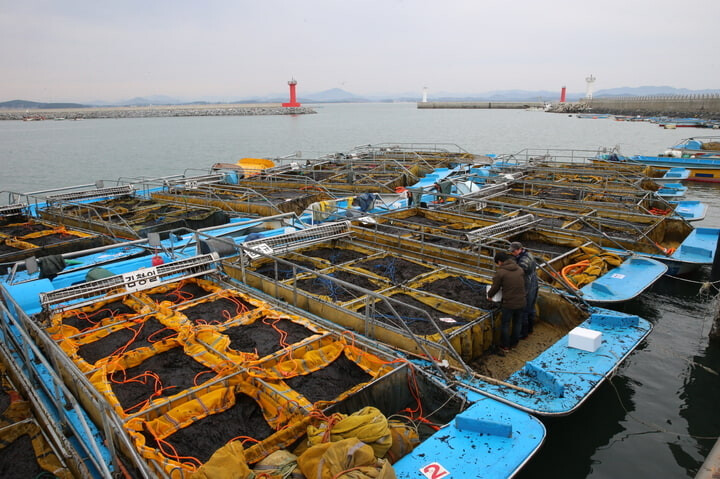
Chungnam Province has initiated a comprehensive research project to map out the future of its thriving Kim (seaweed) industry over the next decade. The initiative aims to enhance the sector's domestic and international competitiveness, solidifying its role as a key pillar of the province's fisheries economy.
On March 28th, the province convened a kick-off meeting at the Provincial Government Office in Bucheon-si, Gyeonggi-do. The event brought together approximately 20 stakeholders, including provincial and municipal officials, industry experts, and leading researchers from Pukyong National University and the Korea Maritime Institute (KMI).
The meeting featured a detailed presentation of the research project's implementation plan by Professor Kim Ji-woong of Pukyong National University, followed by a robust discussion session. The core objective of the research is to develop a well-integrated mid-to-long-term strategy that aligns Chungnam's Kim industry development plan with national legislation, specifically the Act on the Promotion and Support of the Kim Industry and the overarching Basic Plan for Kim Industry Promotion.
The research will delve into critical areas, including a thorough analysis of both the domestic and international Kim markets, a comprehensive survey and current status assessment of Chungnam's Kim industry, the formulation of sector-specific strategies for industry advancement, and the provision of actionable policy recommendations.
Leveraging the findings of this research, Chungnam Province intends to establish clear policy objectives for its Kim industry for the upcoming decade. The province will also identify specific strategic tasks across various sectors, ultimately aiming to propose key projects and necessary institutional reforms to the national government.
South Korea's Kim exports have witnessed remarkable growth, standing as the nation's top single agricultural and fisheries export item. By the end of last year, exports reached an unprecedented $997 million, marking a ninefold increase from the $110 million recorded in 2010.
Chungnam Province, despite accounting for a modest 6-7% of the nation's raw seaweed production, has emerged as a significant player in the export market. The province achieved $195 million in exports in the previous year, primarily focusing on dried and seasoned seaweed products, representing a substantial 19.5% of the total national Kim export value.
However, the industry faces escalating challenges. Climate change-induced rising water temperatures are causing a northward migration of areas suitable for cultivating the cold-water-loving seaweed. Furthermore, the slow pace of developing new, commercially viable seaweed varieties is exacerbating difficulties in maintaining high-quality Kim production annually.
Adding to these concerns, dried seaweed processing facilities within Chungnam Province are generally smaller and less advanced compared to the large-scale operations within Jeonnam Province's specialized complex. The region also faces pressing issues related to the depletion of groundwater and reservoir water sources, alongside the urgent need for effective solutions for treating discharged washing water.
Jeon Sang-wook, Director of Chungnam Province's Maritime and Fisheries Bureau, emphasized the region's potential, stating, "Chungnam is a vital hub for Kim production and processing in South Korea, possessing significant growth potential. This research project will enable us to concretize a future strategy for our provincial Kim industry. We are committed to fostering effective policies through close communication with stakeholders on the ground."
The research project is being undertaken by Pukyong National University and the Korea Maritime Institute (KMI), both highly respected institutions in the maritime and fisheries sector. KMI, a national policy research institute under the Prime Minister's Office, has a proven track record in conducting significant research projects related to the Kim industry, including contributing to the establishment of the Ministry of Oceans and Fisheries' Basic Plan for Kim Industry Promotion and various other national and local government initiatives.
[Copyright (c) Global Economic Times. All Rights Reserved.]



























